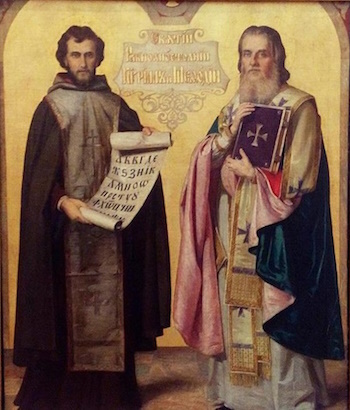
Missionaries to the Slavs
Cyril and Methodius are Greek brothers, honoured for their missionary work to the southern Slavs. Their father was an officer in a part of Greece inhabited by many Slavs, and the siblings became missionaries, teachers, and patron Saints of the Slavic peoples.
Cyril (originally Constantine) refused the governorship of a district such as his brother had accepted among the Slavic-speaking population. He withdrew to the monastery where his brother Methodius had become a monk after some years in a governmental post.
In 862, the patriarch of Constantinople got a request for missionaries from the prince of Moravia, to help establish the church there. Due to their background, the patriarch sent Cyril and Methodius. They were responsible for inventing an alphabet for the Slavonic language (the predecessor of modern Russian). They then produced biblical and liturgical material in Slavonic and did much to establish the church.
Moravia was in part of Europe where it was unclear whether it came under the jurisdiction of Rome in the west or Constantinople in the east. Cyril and Methodius were much harassed by bishops of the Frankish Empire, who favoured “civilised” Latin for the church and regarded Slavonic as “barbaric”. In an effort to get papal approval, the brothers went to Rome, where they had the joy of seeing their new liturgy approved by Pope Adrian II. Cyril, long an invalid, died in Rome 50 days after taking the monastic habit.
Methodius continued their work for 16 more years. He was papal legate for the Slavic peoples, consecrated a bishop and then given an ancient see (now in the Czech Republic). When much of their former territory was removed from their jurisdiction, the Bavarian bishops retaliated with a violent storm of accusation against Methodius. As a result, Louis II of Germany exiled Methodius for 3 years. Pope John VIII secured his release.
They continued their accusations and Methodius had to go to Rome to defend himself against charges of heresy and uphold his use of Slavonic liturgy. He was again vindicated. Legend has it that in a feverish period of activity, Methodius translated the whole Bible into Slavonic in 8 months. He died on Tuesday of Holy Week, surrounded by his disciples, in his cathedral church. His funeral was conducted in Greek, Latin and Slavonic, and he was honoured as one who was “all things to all people”.
BORN: Methodius c.815, Constantine (later known as Cyril)- 826,
Thessalonica, Greece.
DIED: 14 February 869 and 6 April 885;
Rome and
Velehrad, Moravia.
 Welcome
Welcome Calendar
Calendar Today's Word
Today's Word Lauds
Lauds Terce
Terce Sext
Sext None
None Vespers
Vespers Compline
Compline Matins
Matins